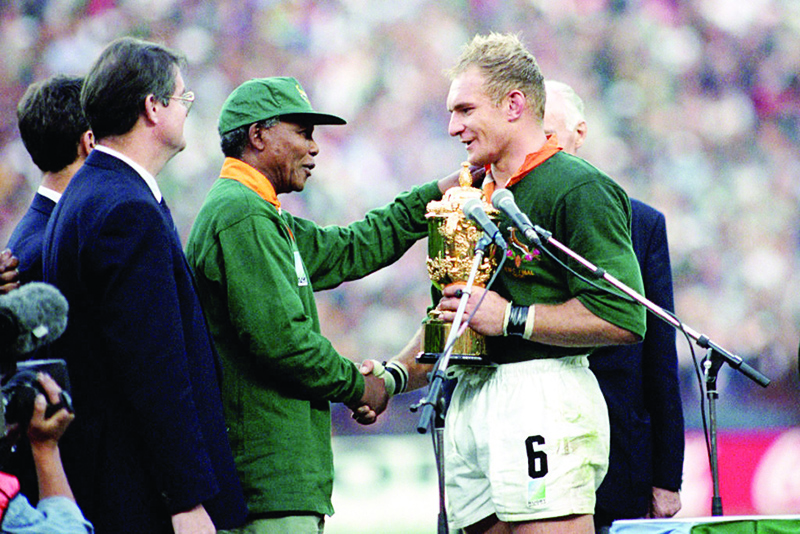
JOHANNESBURG: Francois Pienaar, even 25 years on, conveys a sense of disbelief and awe when he talks of that crisp Highveld winter’s day that the Springboks won the Rugby World Cup for the first time.
The Springbok captain’s wonder is not so much about the fact that his team won the Webb Ellis Cup at Ellis Park on June 24 1995, for he says he always felt they could pull it off, but that he received the golden trophy from President Nelson Mandela. “I am probably the luckiest sports person ever because of the unique relationship (with Mandela),” he says of a man who became a father figure to him.
Their close bond, a young white Afrikaner and the famous black prisoner of Robben Island, grew out of Pienaar’s captaincy of the Springboks and Mandela’s visionary and altruistic support of a team who played in a jersey many of his followers despised.
It started with a cup of tea, he told AFP. “The president invited me to visit him in his office at the Union Buildings in Pretoria. We talked about all things –- not just the World Cup. He wanted to know a lot about me.
“There were so many high-powered people waiting outside to see him and every time Mary (Mxadana, Mandela’s assistant) would come in to hurry him up he would say to her: “Mary, I’m speaking to my captain.”
“I was so nervous before I went into his office and when I left I sat in my car and just felt I had been in the presence of a very wise and caring man and I felt safe. “I know it sounds bizarre. You have no idea of his aura, the genuineness, the sense of humour. We laughed. There was an immediate bond,” says Pienaar.
Mandela visited the Springboks at their final pre-World Cup training session at sports fields in Cape Town and wished the awe-struck group of young men well; receiving in return a Springbok cap from Hennie le Roux, spontaneously removed from the head of Japie Mulder.
To a refrain of “Nelson! Nelson! Nelson!” Mandela officially opened the tournament in Cape Town and the Springboks took what their coach Kitch Christie had referred to as the “high road” by beating defending champions Australia. Thirty-one days and four more games packed full of dramatic incident later Pienaar and his men contested the rugby championship of the world against their oldest and most respected foe, the All Blacks.
EPIC FINAL
An epic final went into extra time before Joel Stransky landed his storied knockout blow sending a wave of patriotic harmony that swept over all creeds and hues such as the country had never experienced before.
Pienaar, interviewed on the field immediately after the final whistle, spoke the inspirational words, “not for 60,000 but for 43 million South Africans” that united a euphoric nation.
Pienaar’s men had lived up to their motto “One Team, One Nation” with their 15-12 victory and Madiba’s captain recalls in wonderment that as the cup was being handed to him they spoke, almost in unison, exactly the same sentence.
“Francois, thank you for what you’ve done for this country” –- “Mr President, thank you for what you’ve done for this country.” The bond between the rugby player and the struggle hero would extend well beyond the World Cup.
“He invited himself to our wedding,” laughs Pienaar. “We were having a celebration at the Union Buildings and I said I wanted to introduce him to my fiancee Nerine. He took her hand and said “would you feel offended if I come to your wedding Nerine?”
“When my son Jean was born he said he wanted to be his godfather, ‘if we didn’t mind’, and he gave him a Xhosa name: Mkhokheli, which means leader.
“Madiba regularly invited us for tea and our second son, Stephane, who was four or five at the time asked ‘why is Mr Mandela only Jean’s godfather and not mine too?’ We had to explain that he didn’t get the call!
“However Stephane ran straight to Madiba and said to him, ‘Mr Mandela, will you please also be my godfather? And Madiba didn’t miss a beat, saying of course and adding that his Xhosa name would be Gorha, the brave one.
“We had such intimate conversations. I am truly the luckiest sportsman alive by a long way; to be so privileged at that time to be the captain, to share the platform with him, to be influenced by him and to get to know him so well,” Pienaar said.
Pienaar was dropped from the Springbok side in 1996 and when he announced he would be leaving to join Saracens in London, Mandela summoned him to lunch and left him with a final request.
“Francois you promise me you will come back one day and you’ll make a difference.” On his return to South Africa, Pienaar obliged by establishing the Make a Difference Leadership Foundation (MAD) in Mandela’s name with the aim of developing academically talented scholars with leadership potential into future leaders for South Africa.
He runs his own sports eventing company, Advent Sport Entertainment and Media (ASEM), which is responsible for, among other properties, the hugely successful Varsity Cup student rugby competition and the Cape Town Marathon.
Pienaar says the life lesson he learnt from the late president Mandela is that “good leadership is based on good values”. —AFP
.jpg)



